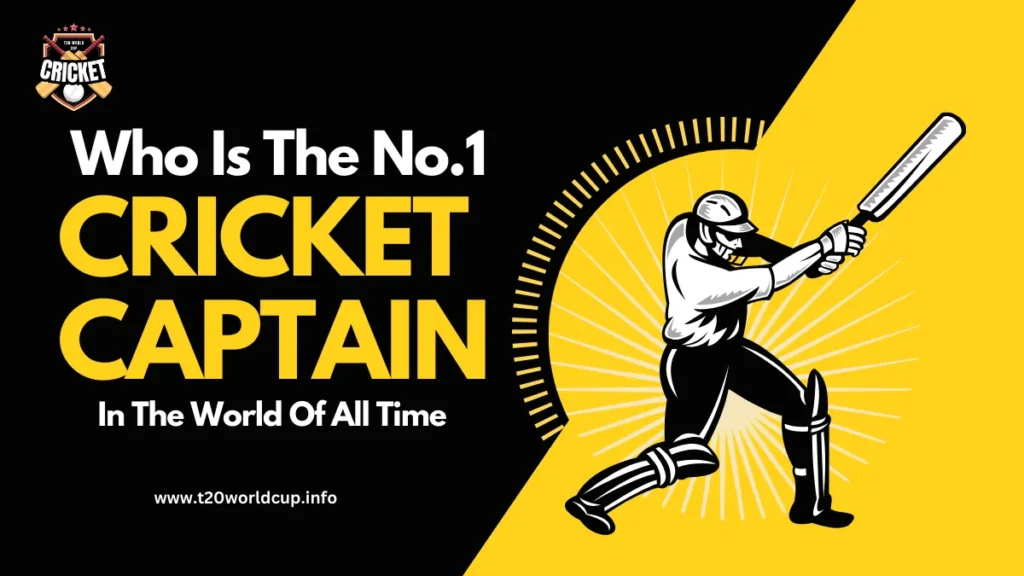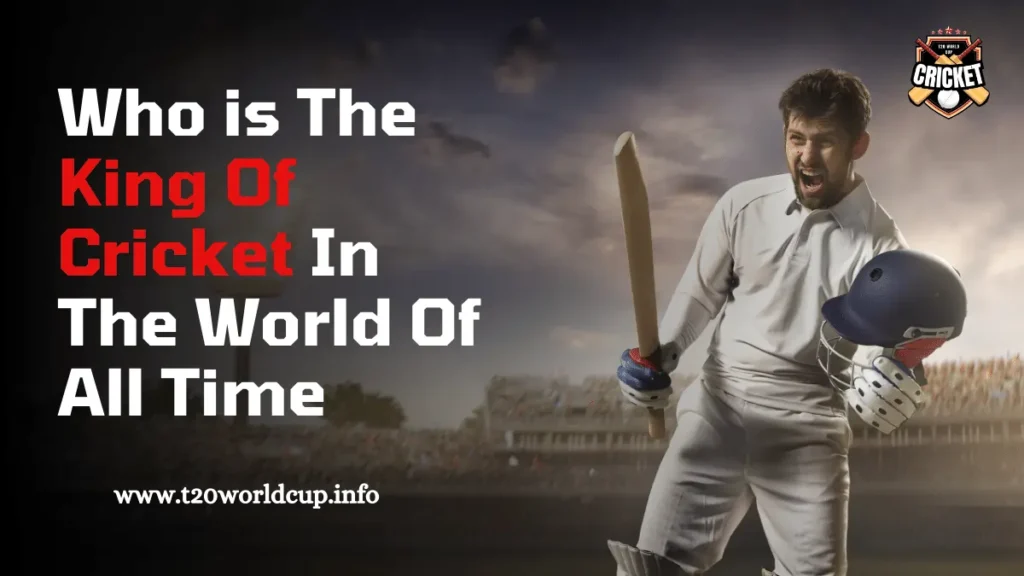In cricket history, the captain’s role is super important. Captains make big decisions on the field and inspire their teams off it. People argue over who’s the best cricket captain ever, making it an exciting journey through cricket’s past.
Being a cricket captain is more than just numbers or personal achievements. It’s about motivating your team, making intelligent choices under pressure, and creating a culture of excellence. Many famous captains like Sir Donald Bradman and Clive Lloyd have made their mark, leading their teams to success.
Figuring out the top cricket captain is tricky because it’s about more than just stats. It’s about qualities like determination, creativity, and facing tough times. We’ll explore cricket’s greatest captains, examine their leadership styles, and analyze their essential moments. We’ll understand what makes a great captain through stories, numbers, and expert opinions.
Join us on this journey through cricket’s past, celebrating the leaders who’ve shaped the game and inspired fans worldwide. Determining the best cricket captain reveals a rich history of human effort, passion, and the pursuit of greatness.
What Makes A Good Cricket Captain?
A good cricket captain possesses leadership qualities, cricketing knowledge, tactical astuteness, and interpersonal skills. Here are some key attributes that contribute to a good cricket captain:

- Leadership: A good captain leads by example on and off the field. They inspire their team through their actions, attitude, and work ethic.
- Tactical Awareness: A good captain understands the game and can make strategic decisions under pressure. This includes setting field placements, choosing bowling changes, and adapting tactics based on the game situation.
- Communication: Effective communication is essential for a captain to convey plans, motivate players, and foster teamwork. Clear and concise communication helps in executing game plans and handling pressure situations.
- Man Management: A good captain knows how to get the best out of each team member, understanding their strengths, weaknesses, and motivations. They create a positive team environment where players feel valued and supported.
- Adaptability: Cricket is dynamic; situations can change rapidly during a match. A good captain is adaptable and can adjust their tactics and strategies based on changing conditions and opposition strengths.
- Decision Making: Captains often face critical decisions during a match, such as declaring an innings, reviewing umpiring choices, or making bowling changes. A good captain makes informed decisions based on their knowledge of the game and situational awareness.
- Emotional Intelligence: Understanding the emotions and mindset of players is crucial for a captain. They must remain calm under pressure, manage their feelings, and support teammates during challenging moments.
- Confidence and Resilience: A good captain exudes confidence and instills belief in their team, even during difficult periods. They remain resilient despite setbacks and inspire their team to bounce back from adversity.
Who Are The Best Cricket Captains Of All Time?
Here are the best cricket captains of all time.
| Name | Country | Years as Captain | Matches as Captain | Won | Lost |
| MS Dhoni | India | 2008-2014 | 60 | 27 | 18 |
| Graeme Smith | South Africa | 2003-2014 | 109 | 53 | 29 |
| Steve Waugh | Australia | 1999-2004 | 57 | 41 | 9 |
| Clive Lloyd | West Indies | 1974-1985 | 74 | 36 | 12 |
| Imran Khan | Pakistan | 1982-1992 | 48 | 14 | 8 |
| Stephen Fleming | New Zealand | 1997-2006 | 80 | 28 | 27 |
| Allan Border | Australia | 1984-1994 | 93 | 32 | 22 |
| Ricky Ponting | Australia | 2004-2010 | 77 | 48 | 16 |
| Brian Lara | West Indies | 1997-2006 | 47 | 10 | 26 |
| Virat Kohli | India | 2014-2022 | 68 | 40 | 17 |
Ultimate Guide For The Best Cricket Captains Of All Time
1. MS Dhoni: The Captain Cool
Mahendra Singh Dhoni was an extraordinary cricket captain who excelled in many areas. He was inspiring, a great leader, and could handle pressure well. Not only was he a fantastic leader, but he was also an excellent batsman and wicketkeeper.
Doing any of these jobs well is tough, but Dhoni did them all brilliantly. What made Dhoni truly remarkable was his ability to perform under immense pressure. When he led India to victory in the 2011 ICC Cricket World Cup, everyone expected him to win. If he hadn’t succeeded, people would see him differently today.
Dhoni stood out because he could think quickly and stay calm in tough situations. Even when others were panicking, he stayed focused. His strong belief in himself and his determination to win made him exceptional among his peers. Dhoni’s legacy continues to inspire cricket fans everywhere.
Graeme Smith: A Legacy of Leadership and Resilience
Graeme Smith became South Africa’s captain when he was just 22 years old, which made him the youngest skipper in the nation’s history. He had to learn how to lead while on the job. People saw potential in him as a leader early in his career.
When Smith started as captain, he was quite young compared to other captains. Some didn’t like that he hadn’t been a captain before like they had. But Smith proved himself by taking control and leading confidently. By the end of his career, even those captains who initially didn’t like him respected him a lot.
Smith wasn’t the most talented batsman ever, but he still did well. He had an average of 48.25 in Test cricket matches, which is quite good. Despite facing challenges, Smith’s leadership and batting skills earned him respect throughout his career.
Steve Waugh: The Epitome of Resilience and Winning Mentality
Steve Waugh was an amazing leader on the cricket field. He wasn’t the most talented batsman, not even in his family. But he still had a great Test career, playing in 166 matches and averaging 51.06.
Waugh followed Alan Border as Australia’s captain and made the team into winners. He had a high win percentage of 71.92 as captain. Waugh’s team also won a world record of 16 Test matches in a row.
Besides his Test achievements, Waugh helped Australia win the 1987 World Cup and captained the team to victory in the 1999 ICC Cricket World Cup. He was a key player in these wins, showing his leadership on and off the field.
Clive Lloyd: The Captain Who Revolutionized Cricket
Clive Lloyd led the West Indies cricket team for 11 years, from 1974 to 1985. He was the captain in 74 Test matches and won 48 of them.
During his time as captain, Lloyd’s team was known for its performance on the field rather than off it. He had to manage some players with big egos, but Lloyd’s strong personality brought them together and made them the most feared team in the world.
Lloyd led his team to win the ICC Cricket World Cup two times in a row, in 1975 and 1979. In 1975, he scored 102 runs in the final, helping his team win. Then, in 1979, he didn’t score many runs but still played a key role in his team’s victory over England. Lloyd’s leadership and performance made him a legendary figure in cricket history.
Imran Khan: A Cricketing Legend and Political Figure
Let’s talk about Imran Khan. He captained Pakistan in 48 matches but won only 14 of them. However, these numbers don’t show his true impact. Back then, Pakistan was still growing in cricket, and Imran Khan played a big role, often carrying the team.
Imran Khan wasn’t just a leader; he was also a diplomat. He could connect with people from different backgrounds and beliefs. He didn’t let things like religion, race, or politics define him. Sometimes, he even broke the usual rules with his lifestyle off the field.
His biggest achievement came in 1992 when he led Pakistan to its first and only ICC Cricket World Cup victory. Pakistan struggled at the tournament’s start in Australia, but Imran Khan motivated the team. In the end, they won the final against England by 22 runs. Imran Khan’s leadership and determination made a huge difference for Pakistan.
Stephen Fleming: A Kiwi Legend Beyond Boundaries
Stephen Fleming was a good cricket player and captain, especially when leading the New Zealand team from 1997 to 2006. He was in charge of 80 Test matches during that time. People liked him a lot because he stayed calm on the field and was smart about the game.
Fleming was a good captain and a skilled and tough batsman, helping the New Zealand team score runs steadily. He didn’t only care about the game but also created a positive atmosphere for the team and helped young players grow.
While Fleming’s time as captain had some great moments, like beating Australia in the 2000 ICC KnockOut Trophy, there were also tough times with the team not playing consistently. But overall, Fleming’s leadership greatly impacted New Zealand cricket, setting the stage for future success.
Even after he stopped playing, Fleming’s influence stayed strong in the cricket community. People still appreciate his contributions to the sport’s growth, and he is remembered as one of New Zealand’s best cricketers.
Who Is The Cricket Captain In The Current Indian Team?
Rohit Sharma is a famous Indian cricket player known for his amazing batting skills and leadership qualities. He was born on April 30, 1987, in Bansod, Nagpur, India. Rohit is a right-handed batsman and sometimes bowls right-arm off-spin.
He started playing for India in 2007 and has become one of the team’s best players, especially in shorter matches like ODIs. He’s known for his smooth batting style, ability to score big points, and handling different situations well.
Rohit Sharma made history by being the first player to hit three double centuries in One Day Internationals (ODIs). His highest score was an incredible 264 runs against Sri Lanka in 2014.
Besides being a great batsman, Rohit also leads the Indian cricket team in limited-overs games like ODIs and T20Is. He’s good at making strategic decisions and motivating his teammates.
Fans and other players admire Rohit Sharma for his contributions to Indian cricket. He’s a key player and leader, making a big impact on the team and the sport.
Why Are They Considered The Best Cricket Captains In The World Of All Times
The title “best cricket captain of all time” is subjective and open to interpretation, as different people may have varying opinions based on their perspectives, experiences, and criteria for judging leadership in cricket. However, several captains throughout history are often considered among the best for various reasons:
1. Success and Achievements
Many of the best cricket captains have led their teams to significant victories in major tournaments, series, and matches. Their ability to strategize, motivate players, and make crucial decisions under pressure has contributed to their teams’ success on the field.
2. Innovative Tactics
Exceptional cricket captains are often praised for their innovative tactics and approaches to the game. They are unafraid to think outside the box, adapt to changing conditions, and introduce new strategies to outsmart their opponents.
3. Leadership Skills
The best cricket captains possess strong leadership qualities such as communication, vision, integrity, and the ability to inspire and unite their team members. They lead by example and earn the respect and trust of their players through their actions and decisions.
4. Ability to Handle Pressure
Cricket is a sport that involves high-pressure situations, and the best captains thrive in such environments. They remain calm, composed, and focused, guiding their team through challenging moments and leading by example with their resilience and determination.
Also Read: How Many Cricket Stadiums In India: A Complete List [2024]
5. Legacy and Impact
The best cricket captains leave a lasting legacy transcending their time on the field. Their influence extends beyond their playing days, shaping the culture, values, and future direction of their teams and the sport.
Conclusion
In conclusion, determining the No. 1 cricket captain in the world of all time is a complex and subjective endeavor. Across generations, various leaders have left indelible marks on the sport, each possessing unique qualities and achievements that make them stand out.
While statistics and achievements provide valuable insights, the essence of cricket captaincy transcends mere numbers. It encompasses leadership, innovation, resilience, and the ability to inspire greatness in others.
Ultimately, the quest to anoint the No. 1 cricket captain celebrates the rich tapestry of human endeavor, passion, and excellence that defines the spirit of cricket. Regardless of rankings or titles, the legacy of these cricketing luminaries will continue to inspire generations of players and fans, shaping the timeless narrative of cricket’s greatest leaders.
FAQs- Who Is The No.1 Cricket Captain In The World Of All Time
Is there a definitive way to rank cricket captains across different eras?
No, there is no definitive way to rank cricket captains across different eras due to differences in playing conditions, rules, and opposition. Each era had its challenges and contexts, making direct comparisons challenging.
What role do statistics play in determining the best cricket captain?
Statistics such as win-loss record, batting and bowling averages, and team performance under the captain’s leadership provide valuable insights into a captain’s effectiveness. However, statistics alone may not fully capture a captain’s impact on the team and the game.
What role do statistics play in determining the best cricket captain?
Statistics such as win-loss record, batting and bowling averages, and team performance under the captain’s leadership provide valuable insights into a captain’s effectiveness. However, statistics alone may not fully capture a captain’s impact on the team and the game



